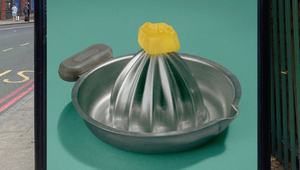
MCR Operators: What Are They and Why Are They Vital to Production?

Most people probably won’t be aware of what a master control room operator is, but according to Alex Reid, junior MCR operator at Girl&Bear, it is one of the pillars that keep productions going smoothly.
In fact, MCR operators are usually trained in every aspect of the production process and are responsible for set ups, operating studio equipment, broadcast monitoring, maintaining the work schedule, quality control work, fault finding and troubleshooting, assisting senior editors as requested and overall training to ensure all hardware and software is utilised competently and efficiently.
MCR operators are those who are behind the scenes of everything in post production and without their vital contribution, it would probably be quite obvious how important team effort is for a set to go smoothly.
LBB’s Zoe Antonov spoke to Alex to find out why she fell in love with the position of MCR operator, why post production needs more women in post and why her part in the process is extremely important.
LBB> Did you always know you'd get into post production and what steps did you take to get into the industry?
Alex> Ever since I chose to study film and media studies at GCSE and A-Levels, I always knew that I wanted a career in the industry. Of course when you are young and getting ready to move up in the world you dream big, I was expecting to be a producer in Hollywood and attending the Oscars by the time I was 25. But life has plenty of paths with many turns and within the first two weeks of attending university, I found my passion in post production. So, I swapped courses and I started to feel right at home.
Ravensbourne University provides their students with great opportunities during second year to complete work experience. Over the six allocated weeks I got myself into three different post houses, this helped me not only expand my knowledge of the industry but also was able to start building up my contacts.
After I finished my degree I sent out email after email, CV after CV, to try and find someone in the “holy land” that would take a chance on me. After quite a few “sorry we aren’t looking at this time”, I finally got my ticket into my career and started working at a post production house as a runner.
LBB> And was the role of MCR operator something you had in mind the whole time, or did it come more out of the search for a specialism - how did it start?
Alex> MCR was always on my mind. MCR operators are the unsung heroes of post production. Many people try to skip this step and personally, I think that is silly. The role itself is an important stepping stone and something that will help you progress further in the post world. You learn the technical skills, workflow and how to troubleshoot problems as they arise (as well as get to understand that there are plenty of technical difficulties in the world of today)
Although I had found a job at a post house, I did end up taking a gap year shortly after university as I wanted to go travelling and see more of the world before settling down to my career.
When I decided to get back to the grind, I found another job as a runner but was made redundant a week later after the pandemic hit. This was devastating but I picked myself up and got on with it. A couple of years later when everything went back to normal and I was walking dogs for a living, the boss called me and asked me if I wanted my job back. I couldn’t say yes quickly enough.
After running for six months, the company took on some long-form jobs which meant the current MCR operators were moved up to junior audio engineers and I was slingshotted to junior MCR… on my own. It was very much a sink or swim in the deep end with limited training but that is how I learn best. I picked up so many skills and learned from my mistakes.
LBB> If one does want to concentrate on being an MCR operator, what is the kind of career ladder they need to take on before they arrive at their desired position?
Alex> The best advice I can give is to start as a runner. There is a lot of hate for this role but ultimately it will start teaching you skills before you even know it. You bring in a cup of tea and some biscuits whilst an artist and client are having a discussion on what aspect ratio they will be exporting the social deliverables at. So already, you are starting to pick up the terminology and understand the workflow.
Runners will have downtime and you should utilise this as best you can. Sit in with the operators, try and make notes on what they are doing and WHY they are doing it. Ask as many questions as possible because no question is a stupid question.
LBB> Is there a big difference between being a woman and a man in this part of post production and what has your experience been like? What can the industry do to be better in the sphere?
Alex> YES. If I had a pound for everytime someone said “it's weird seeing a girl in MCR” I would be filthy rich. This is mainly because the technical side of post production is very male oriented, it is only now where you are starting to see more women taking the same path. I think the industry could do better by normalising women in post production full stop. A lot of the owners have always known the traditional structure with men as the engineers and women as the producers but I hope through the upcoming generations that starts to wear off and more women break through and become the head of post production.
LBB> What does your day-to-day look like as an MCR operator and what are some of the most intricate parts of the position?
Alex> MCR are working off of requests around 70% of the time and the other 30% is focused on housekeeping such as archiving, checking for updates, making sure suites are running and are set up correctly etc.
Depending on what jobs are booked, you could be ingesting rushes and creating low-res files in the morning and then you could be conforming and prepping the pictures for grade/VFX in the afternoon. But the next day it might be delivering a broadcast file for TV that needs to be quality checked and exporting the social versions.
I can be sure to say that no two days are the same and that is what keeps you on your toes.
LBB> Are there many learning curves of the job and if so what are the weirdest ones, how did you yourself learn on the job?
Alex> Oh 100%. I have been in this specific role for over a year now and I am still learning new things. But that is the fun of it. As said before, I was thrown into the deep end. I want to make it clear that it isn’t ideal to be in MCR on your own, there should always be at least two of you. MCR is a bottleneck and working off of requests you can get slammed pretty quickly but when working in a well-oiled team you will be able to organise yourselves to ensure that the work is done correctly and efficiently.
Before joining Girl&Bear and speaking with some friends who had been in my shoes at my previous employers, I thought MCR was going to be a place where you were stressed all the time that you needed to work 12-hour days with no time for a lunch break and you just had to eat at your desk and even forget to go to the toilet. That is NOT the case and it's a shame that a couple of post houses have given the role that reputation. There is such a thing as work-life balance and it is so important to focus on you, work is work and your health is your livelihood - don’t forget that!
LBB> What are some super valuable skills you need to have as a person in your position and why do they help you work better with the rest of the team?
Alex> Take your time. You will be juggling all sorts of requests but it is so important to understand the job at hand and not to rush. I am a very manic, fast-paced person who is always trying to get things done as quickly as possible (I think this is from working in hospitality). Now I have slowed down loads and it's helped me a lot.
Communication is KEY. If you don’t understand something, ask. If a producer hasn’t given you all the relevant information, ask. If you are getting overwhelmed with requests let people know that you have a lot on your plate.
LBB> Which other part of post production appeals to you?
Alex> Personally, all of it interests me. I find it fascinating watching an idea grow into something beautiful that is going to be seen by millions of people all over the world. There are so many steps that the project goes through before reaching our television screens and is touched by so many hands.
In saying that, as post production is my true passion, colour grading really stands out for me. You can change the mood of the whole piece purely on the colour. Most of my friends and family never really fully understood what a ‘colour grade’ is and this is how I respond:
“If you were to watch Game of Thrones and Bridgerton side by side - would you be able to see the difference? One uses dark moody tones to emphasise on the sinister plot line whereas the other uses bright and bold colours to demonstrate the romantic twists.”
LBB> What is your advice to other juniors with a lot less experience when getting into the production world, especially in London?
Alex> When it comes to advice, I would say take your time, enjoy it and don’t rush. There will be times when you struggle and there will be rejections but it will all be worth it in the end. Take in the city and the network until your heart's content because at the end of the day, what is for you won’t go past you.















